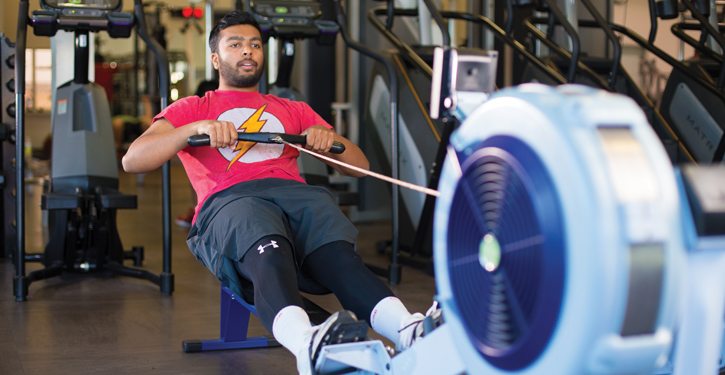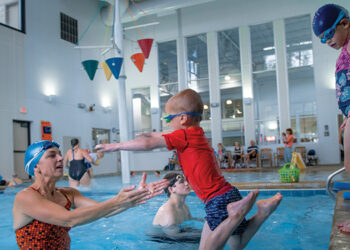Industry experts discuss community rec centers’ unique positioning for wellness programming.
The heart of wellness in community rec centers is what Vicki McGrath, the senior director of wellness at the Peninsula JCC (PJCC), refers to as “the social workout.” It represents the direction wellness is heading toward as well-being initiatives tap into facets of physical, mental and social health. According to McGrath and other industry professionals, this trend won’t be slowing down anytime soon.
To explain why, McGrath divided how people reacted to the COVID-19 pandemic into two categories. Some are looking to return to an active lifestyle and others yearn to be a part of a community again. The PJCC helps both through wellness programming and spaces.
“I have never seen more people wanting to do personal training right out of the gate,” remarked McGrath. “Before the COVID-19 pandemic, we needed to sell fitness and wellness. But now they want to train after being stuck at home, and the JCC provides that social aspect.”
To accommodate this upswell in demand for personal training and well-being, the PJCC created spaces where these sessions could occur with more privacy. Recovery equipment from PowerPlay, Theraguns and massage beds are used by personal trainers to individualize clients’ experience.
Another area growing in popularity is strength training. The PJCC added two Eleiko flooring pads to absorb sound and are remaining cognizant for other ways to improve these areas. McGrath noted this is partly due to the surge in popularity of boutique fitness studios that has since plateaued or dipped. Members want community rec centers to be a one-stop-shop for strength training, yoga, Pilates, barre and other experiences they once got from independent studios.
“We’ve been trying to adapt to this specific problem,” said McGrath. “It’s a good problem for us. The more creative people can be, the better. People are realizing they can get everything in one place, and that’s one of our strengths.”
Another way the PJCC is getting creative with personalization is through AI which Amanda Loveland, the chief marketing officer at the PJCC, has been spearheading. She’s also the marketing peer education cohort leader for the JCC Association of North America, working to teach and provide resources about using AI in operations. For example, the J integrates AI into wellness by using it to help with research and data analysis.
“One of the awesome things about our AI tech stack is we’re able to do research at a significantly quicker pace and see those trends and analyze the data using tools like Perplexity AI,” said Loveland. “We have immediate access to what’s trending and what the news says without having to wait for nationwide studies or hiring a data analyst which could mean three to six to 12 months to actually look at what’s happening in the world.”
Loveland expressed how important it is to intentionally act upon trends like wellness and AI. She explained how there are two extremes of reaction which are ignoring the trend completely and integrating it without knowing if its benefits are real. Being somewhere in the middle is ideal.
“You don’t want to be left behind and not be integrating innovative tools,” explained Loveland. “You also don’t want to be at the forefront and have what really matters become watered down. We wait until we figure out what really works and spice it up for our team and members in a way that puts a spotlight on what we do best.”
The Dell JCC, a part of Shalom Austin, also highlighted an innovative technology that promotes wellness opportunities through the Technogym app. The programs members can follow on their phone can be a great alternative to personal training for those facing financial or scheduling limitations.
“It’s great because it motivates people to come in here and have the experience they want to have,” said Robbin Tran, the fitness and wellness director at the Dell JCC. “Working with Technogym allows us to offer more programming because of how big of a company they are and how they’ve thought through these offerings. We’re able to help more members in their fitness journey.”
Bringing in more scientific data was another field Tran predicted will increase. The J is beginning to implement this through the Technogym app which can store and assess personal health data from InBody blood pressure cuff. Members are motivated by tangible numbers and results, and Tran explained how body assessments are becoming increasingly popular offerings.
“We’re working on revamping how we provide assessments,” said Tran. “We’re providing them at an affordable price because we believe people deserve to know where they’re at and make their own choices while knowing our available options. I have some people who don’t sign up for any other services beside the assessment.”
Providing these evaluations can also lead to better relationships between trainers and members who can look at the results and discuss interpretations and action items together. While technology and AI can be great tools to enhance the wellness experience, what will keep members coming back are these connections.
“There isn’t a shortcut to being healthy; you have to put in the work,” said Mark Pattis, the senior health and wellness director at the Dell JCC. “More information and data coming out will certainly help members understand what they need to be doing to be healthier, but the foundation of wellness will stay consistent which is showing up, putting in the work, and having instructors and trainers who hold you accountable.”










